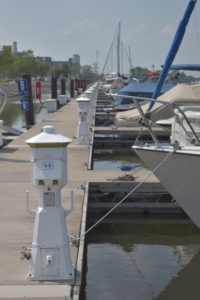Memorial Day has long been seen as the kickoff of summer. In a time of COVID-19 safer-at-home practices, the promise of a season of outdoor pleasures is even more sweet this year. For many in Wisconsin, boating is one of those pleasures. Here are five things to know about boating in the Badger State, and about a Wisconsin Sea Grant-supported initiative, the Wisconsin Clean Marina Program.
When it comes to boating, Wisconsin’s got historical cred.
With the Mississippi, Wisconsin and St. Croix rivers, the Great Lakes and 15,000 inland lakes, it’s only natural people in this state find ways to float upon water bodies. Entrepreneurs have stepped in to fill the need.
A native of Mequon, Wisconsin, started manufacturing motorboat engines out of his machine shop in 1939. That was the birth of Mercury Marine, now the world’s largest manufacturer of boat engines. Builders have also set up shop here, including Manitowoc’s luxury yacht maker Burger Boat Co., which had its origins in crafting commercial fishing vessels beginning in the mid-1800s.
Mrs. Puff wouldn’t find work in Wisconsin.
Mrs. Puff is the beleaguered boat-driving instructor in the animated television program SpongeBob Squarepants. While SpongeBob is a hapless pupil and in Wisconsin Mrs. Puff would likely encounter more skilled boat operators, state law doesn’t require in-person instruction.
To operate a boat, those who are at least 16 years old and born on or after Jan. 1, 1989, must pass an online boater safety course and carry a boater safety certification card, which is like a driver’s license. The Department of Natural Resources provides the training, issues the card and handles registration for all watercraft longer than 12 feet. Sailboards and manually powered watercraft like a kayak or canoe don’t need to be registered.

A Clean Marina in Wisconsin. Image by Marie Zhuikov, Wisconsin Sea Grant.
Boater Safety Certification Card in hand. Now, off to a marina.
The Wisconsin Marine Association notes that marinas and related industries and services contribute more than $2.7 billion to Wisconsin’s economy. The association counts more than 170 boating facilities in Wisconsin. Some of these businesses opt to become a certified Clean Marina.
A certified Clean Marina. What is that?
A Clean Marina voluntarily adopts practices to reduce water pollution from its facility and boaters. The efforts lead to clean lakes and rivers, which are good for business. There are currently 20 certified marinas in Wisconsin and another 20 establishments are working through the rigorous steps to become certified. Marinas see the benefits of becoming certified—creating a safer and healthier place to work and recreate, gaining an enhanced image among boaters and the community, and preventing pollution and the spread of aquatic invasive species.
It comes down to details.
Marinas perform a self-evaluation of their business using the Clean Marina Guidebook and certification checklist from the Wisconsin Clean Marina Program. The guidebook and checklist include things like preventing and cleaning up fuel spills, reducing stormwater pollution and educating boaters. Marinas also host visits from the program coordinator to ensure adherence to the practices.
The Clean Marina Program is administered by Wisconsin Sea Grant in partnership with the Wisconsin Marine Association, Wisconsin Coastal Management Program, Wisconsin Department of Natural Resources and Fund for Lake Michigan.
For more information, contact Theresa Qualls, Wisconsin Clean Marina coordinator.


